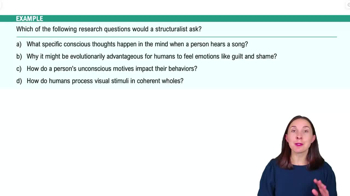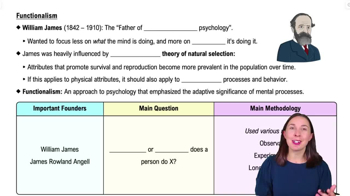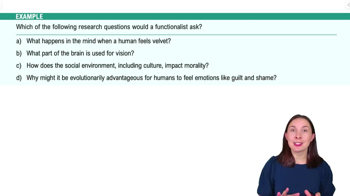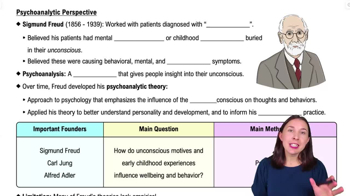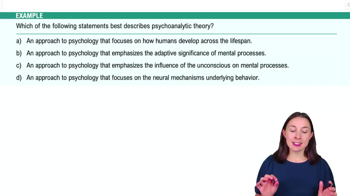Table of contents
- 1. Introduction to Psychology1h 43m
- 2. Psychology Research2h 20m
- 3. Biological Psychology2h 41m
- 4. Sensation and Perception28m
- 5. Consciousness and Sleep32m
- 6. Learning41m
- 7. Memory34m
- 8. Cognition37m
- 9. Emotion and Motivation35m
- 10. Developmental Psychology33m
- 11. Personality48m
- 12. Social Psychology41m
- 13. Stress and Health41m
- 14. Psychological Disorders44m
- 15. Treatment47m
1. Introduction to Psychology
Early Schools of Thought
Struggling with Psychology?
Join thousands of students who trust us to help them ace their exams!Watch the first videoMultiple Choice
_____ is known as the father of psychology.
A
William James
B
Wilhelm Wundt
C
Edward Titchener
D
Sigmund Freud
 Verified step by step guidance
Verified step by step guidance1
Identify the key figures in the history of psychology mentioned in the problem: William James, Wilhelm Wundt, Edward Titchener, and Sigmund Freud.
Understand the contributions of each figure to the field of psychology. For example, Wilhelm Wundt is known for establishing the first psychology laboratory.
Recognize that Wilhelm Wundt is often referred to as the 'father of psychology' because he separated psychology from philosophy by analyzing the workings of the mind in a more structured way, with the emphasis on objective measurement and control.
Consider the historical context and significance of Wundt's work in the late 19th century, which laid the foundation for psychology as an independent scientific discipline.
Conclude that Wilhelm Wundt is the correct answer based on his pivotal role in the development of psychology as a distinct scientific field.

 5:44m
5:44mWatch next
Master Structuralism with a bite sized video explanation from Hannah Gordils
Start learningRelated Videos
Related Practice



